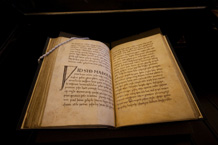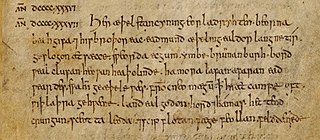"The Rhyming Poem", also written as "The Riming Poem", is a poem of 87 lines found in the Exeter Book, a tenth-century collection of Old English poetry. It is remarkable for being no later than the 10th century, in Old English, and written in rhyming couplets. Rhyme is otherwise virtually unknown among Anglo-Saxon literature, which used alliterative verse instead.
The poem is found on folios 94r-95v, in the third booklet of the Exeter Book, which may, or may not, be an indication of composition. Many scholarly attempts have been made to decipher the collation of the Exeter Book and to determine if works were placed in the manuscript by date or theme. Unlike the Monstrarum Librum of the Beowulf manuscript, the Exeter Book appears to be a self-consciously archival collection.
The poem concerns the troubles and transience of life. It contrasts the life of a ruler, from the time of his birth to his prosperous rule and life at court (lines 1-42), with his life after his fall, the subsequent rise of hostilities (lines 43-69) and his death (lines 70-79), ending with a reflection on the eternal glories of Heaven and the necessity of penance (lines 80-87). The poet may have taken the Book of Job, chapters 29 and 30, as its inspiration.
Old English literature refers to poetry and prose written in Old English in early medieval England, from the 7th century to the decades after the Norman Conquest of 1066, a period often termed Anglo-Saxon England. The 7th-century work Cædmon's Hymn is often considered as the oldest surviving poem in English, as it appears in an 8th-century copy of Bede's text, the Ecclesiastical History of the English People. Poetry written in the mid 12th century represents some of the latest post-Norman examples of Old English. Adherence to the grammatical rules of Old English is largely inconsistent in 12th-century work, and by the 13th century the grammar and syntax of Old English had almost completely deteriorated, giving way to the much larger Middle English corpus of literature.
Cynewulf is one of twelve Old English poets known by name, and one of four whose work is known to survive today. He presumably flourished in the 9th century, with possible dates extending into the late 8th and early 10th centuries.
"Widsith", also known as "The Traveller's Song", is an Old English poem of 143 lines. It survives only in the Exeter Book, a manuscript of Old English poetry compiled in the late-10th century, which contains approximately one-sixth of all surviving Old English poetry. "Widsith" is located between the poems "Vainglory" and "The Fortunes of Men". Since the donation of the Exeter Book in 1076, it has been housed in Exeter Cathedral in southwestern England. The poem is for the most part a survey of the people, kings, and heroes of Europe in the Heroic Age of Northern Europe.

The Exeter Book, also known as the Codex Exoniensis or Exeter Cathedral Library MS 3501, is a large codex of Old English poetry, believed to have been produced in the late tenth century AD. It is one of the four major manuscripts of Old English poetry, along with the Vercelli Book in Vercelli, Italy, the Nowell Codex in the British Library, and the Junius manuscript in the Bodleian Library in Oxford. The book was donated to what is now the Exeter Cathedral library by Leofric, the first bishop of Exeter, in 1072. It is believed originally to have contained 130 or 131 leaves, of which the first 7 or 8 have been replaced with other leaves; the original first 8 leaves are lost. The Exeter Book is the largest and perhaps oldest known manuscript of Old English literature, containing about a sixth of the Old English poetry that has come down to us.

"Wulf and Eadwacer" is an Old English poem of famously difficult interpretation. It has been variously characterised, (modernly) as an elegy, (historically) as a riddle, and as a song or ballad with refrain. The poem's complexities are, however, often asserted simply to defy genre classification, especially with regard to its narrative content. The poem's only extant text is found at folios 100v-101r in the tenth-century Exeter Book, along with certain other texts to which it possesses qualitative similarities.

The Wanderer is an Old English poem preserved only in an anthology known as the Exeter Book, a manuscript dating from the late 10th century. It comprises 115 lines of alliterative verse. As is often the case with Anglo-Saxon verse, the composer and compiler are anonymous, and within the manuscript the poem is untitled.
The Seafarer is an Old English poem giving a first-person account of a man alone on the sea. The poem consists of 124 lines, followed by the single word "Amen". It is recorded only at folios 81 verso – 83 recto of the tenth-century Exeter Book, one of the four surviving manuscripts of Old English poetry. It has most often, though not always, been categorised as an elegy, a poetic genre commonly assigned to a particular group of Old English poems that reflect on spiritual and earthly melancholy.

Saint Guthlac of Crowland was a Christian hermit and saint from Lincolnshire in England. He is particularly venerated in the Fens of eastern England.

The Vercelli Book is one of the oldest of the four Old English Poetic Codices. It is an anthology of Old English prose and verse that dates back to the late 10th century. The manuscript is housed in the Capitulary Library of Vercelli, in northern Italy.
Elene is a poem in Old English, that is sometimes known as Saint Helena Finds the True Cross. It was translated from a Latin text and is the longest of Cynewulf's four signed poems. It is the last of six poems appearing in the Vercelli manuscript, which also contains The Fates of the Apostles, Andreas, Soul and Body I, the Homiletic Fragment I and Dream of the Rood. The poem is the first English account of the finding of the Holy Cross by Saint Helena, the mother of Emperor Constantine. The poem was written by Cynewulf some time between 750 and the tenth century. It is written in a West Saxon dialect, but certain Anglianisms and metrical evidence concerning false rhymes suggest it was written in an Anglian rather than Saxon dialect. It is 1,321 lines long.

"The Rime of King William" is an Old English poem that tells the death of William the Conqueror. The Rime was a part of the only entry for the year of 1087 in the "Peterborough Chronicle/Laud Manuscript." In this entry there is a thorough history and account of the life of King William. The entry in its entirety is regarded "as containing the best contemporary estimate of William's achievements and character as seen by a reasonably objective Englishman". As a resource, earlier writers drew from this in a more literal sense, while later historians referred to it more liberally. The text in its original language can be found in The Peterborough Chronicle 1070–1154, edited by Cecily Clark. A modern translation can be found in the Anglo-Saxon Chronicles translated by G.N. Garmonsway. Seth Lerer has published a more recent modern translation of "The Rime of King William" in his article, "Old English and Its Afterlife," in The Cambridge History of Medieval English Literature.
"The Husband's Message" is an anonymous Old English poem, 53 lines long and found only on folio 123 of the Exeter Book. The poem is cast as the private address of an unknown first-person speaker to a wife, challenging the reader to discover the speaker's identity and the nature of the conversation, the mystery of which is enhanced by a burn-hole at the beginning of the poem.
Soul and Body refers to two anonymous Old English poems: Soul and Body I, which is found in the Vercelli Book, and Soul and Body II, found in the Exeter Book. It is one of the oldest poems to have survived in two manuscripts of Old English, each version slightly different from the other. Despite their differences, the Soul and Body poems address similar themes. Both versions ask the committed and penitent Christian reader to call to mind his bodily actions on earth in relation to his soul’s afterlife. A sense of exigency is found in the poems, imploring the body to live according to the soul's fate and not the desires of the flesh.
Guthlac A and Guthlac B are a pair of Old English poems written in celebration of the deeds and death of Saint Guthlac of Croyland, a popular Mercian saint. The two poems are presented consecutively in the important Exeter Book miscellany of Old English poetry, the fourth and fifth items in the manuscript. They are clearly intended to be considered two items, judging from the scribe's use of large initials at the start of each poem.
The titles "Maxims I" and "Maxims II" refer to pieces of Old English gnomic poetry. The poem "Maxims I" can be found in the Exeter Book and "Maxims II" is located in a lesser known manuscript, London, British Library, Cotton Tiberius B i. "Maxims I" and "Maxims II" are classified as wisdom poetry, being both influenced by wisdom literature, such as the Psalms and Proverbs of the Old Testament scriptures. Although they are separate poems of diverse contents, they have been given a shared name because the themes throughout each poem are similar.
"The Fortunes of Men", also "The Fates of Men" or "The Fates of Mortals", is the title given to an Old English gnomic poem of 98 lines in the Exeter Book, fols. 87a–88b.

Exodus is the title given to an Old English alliterative poem in the 10th century Junius manuscript. Exodus is not a paraphrase of the biblical book, but rather a re-telling of the story of the Israelites' flight from Egyptian captivity and the Crossing of the Red Sea in the manner of a "heroic epic", much like Old English poems Andreas, Judith, or even Beowulf. It is one of the densest, most allusive and complex poems in Old English, and is the focus of much critical debate.

The "Battle of Brunanburh" is an Old English poem. It is preserved in the Anglo-Saxon Chronicle, a historical record of events in Anglo-Saxon England which was kept from the late ninth to the mid-twelfth century. The poem records the Battle of Brunanburh, a battle fought in 937 between an English army and a combined army of Scots, Vikings, and Britons. The battle resulted in an English victory, celebrated by the poem in style and language like that of traditional Old English battle poetry. The poem is notable because of those traditional elements and has been praised for its authentic tone, but it is also remarkable for its fiercely nationalistic tone, which documents the development of a unified England ruled by the House of Wessex.
Genesis is an Old Saxon Biblical poem recounting the story of the Book of Genesis, dating to the first half of the 9th century, three fragments of which are preserved in a manuscript in the Vatican Library, Palatinus Latinus 1447. It and the Heliand, a heroic poem based on the New Testament, a fragment of which is also included in the same manuscript, constitute the only major records of Old Saxon poetry. It is also the basis of the Anglo-Saxon poem known as Genesis B, and Eduard Sievers postulated its existence on linguistic evidence before the manuscript was discovered.
Exeter Book Riddle 30 is one of the Old English riddles found in the later tenth-century Exeter Book. Since the suggestion of F. A. Blackburn in 1901, its solution has been agreed to be the Old English word bēam, understood both in its primary sense 'tree' but also in its secondary sense 'cross'.






